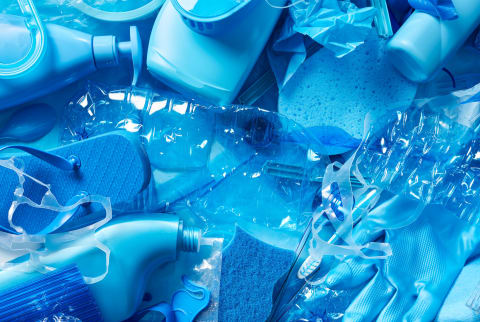Advertisement
The Recycling Industry Has Been Struggling For Years — But You Can Help Out


China was the recycling mecca of the world—the country where 70% of the world's plastic waste went to be broken down and reused—until early last year, when the government decided to block the import of materials like metal, steel, and plastic, claiming that the massive quantities of goods that were coming in were contaminated and basically worthless.
The decision set the global waste industry into a frenzy. In the months since, countries like India and Malaysia have been scrambling to set up new waste markets, as former trash exporters like the U.S. have been left wondering what to do with all their recyclables.
"Now we have this huge supply, and the infrastructure is not there because we haven't needed it to be there," Beth Porter, a director at Green America and author Reduce, Reuse, Reimagine: Sorting Out the Recycling System, explains. "There's a scramble to build a recycling infrastructure to meet the modern waste stream." In the interim, she says, some markets have been forced to send recyclables to the landfill or the incinerator until they figure out next steps: "When the policy first started happening, some recycling facilities would actually just stockpile—they were keeping recyclables and filling their parking lots even... But of course, at a certain point, we are consuming and disposing of so much material every single day that there's a lot of pressure on companies to deal with it."
Needless to say, recycling has hit a rough patch, but it could prove the wake-up call the industry needs: "Some are looking at this as a huge opportunity to correct these problems and invest in a system that can deliver more of the environmental and economic benefits that recycling was meant to deliver on," Porter says. For this to happen in the U.S., it'll take the government enacting laws to tackle our waste problem (like the one we might to see from Sen. Tom Udall and U.S. Rep. Alan Lowenthal this fall), cities and states investing in recycling education (such as Michigan's new $15 million Recycling Raccoons campaign), and brands designing products that are easier to recycle or reuse. As consumers, we all have a role to play too! Here are three ways to help out:
Reduce your waste—especially single-use plastics.
When the recycling industry is overtaxed (and even when it's not), it's important to limit the number of items you're tossing in the first place. Remember the old "reduce, reuse, recycle" motto is in that order for a reason: First and foremost, we should all aim to reduce the amount of stuff we buy and reuse the things we do have. Recycling is an absolute last resort. This is especially true when it comes to plastic, which tends to be more difficult to break down because recycling systems from olden days were not created to handle the many different types of it now available. It also can only be broken down a handful of times while things like aluminum and glass can be recycled indefinitely.
Remember: No tanglers, no tech, no tiny items.
In addition to banning certain materials, China is now instituting a 0.5% contamination rate rule, meaning only 0.5% of incoming recyclables can be contaminated. Porter estimates that 25 to 30% of our recycling stream in the U.S. is currently contaminated, so there's lots of room for improvement. While recycling rules vary across the country (you can read up on the ones in your area here), Porter has noticed many people across the board tend to make the same recycling mishaps. Until we can all get our hands on personal robots that sort through our trash for us, we can avoid contamination by remembering her "no tanglers, no tech, no tiny items" tagline:
- No tanglers: "Tanglers" are anything that could get tangled in recycling machinery. Think twinkle lights, garden hoses, or soft plastic bags. These should generally stay out of the bin. Some grocery stores will now accept plastic bags.
- No tech: Lithium-ion batteries and cellphones have been known to cause fires in garbage trucks and recycling sorting facilities. Read up on how to get rid of your e-waste responsibly here.
- No tiny items: "Many municipalities say that anything smaller than 2 inches is too small to go through the system correctly," explains Porter. That means things like wine corks and plastic straws should go in the trash, and bottle caps should be screwed back on their bottle (as long as it's made out of the same material) before being recycled.
Finally, all of your recyclables should be dry and free of food residue. For sticky stuff like nut butter, soak the jar overnight to get it all off.
Send a message to the companies you buy from.
Porter is encouraged to see that more companies are starting to design circular products and packaging that can be reused or recycled. As consumers, we can keep this momentum going by telling brands that this is important to us. Your note can be as simple as this: "Hi [insert company name], I love your [insert product name], but I'm frustrated that its packaging isn't recyclable. Can you tell me what you're doing to make your packaging easier on the planet?" If enough people send messages like these via email or social media, companies will be more inclined to take the issue seriously.
Watch Next
Enjoy some of our favorite clips from classes
Enjoy some of our favorite clips from classes
What Is Meditation?
Mindfulness/Spirituality | Light Watkins
Box Breathing
Mindfulness/Spirituality | Gwen Dittmar
What Breathwork Can Address
Mindfulness/Spirituality | Gwen Dittmar
The 8 Limbs of Yoga - What is Asana?
Yoga | Caley Alyssa
Two Standing Postures to Open Up Tight Hips
Yoga | Caley Alyssa
How Plants Can Optimize Athletic Performance
Nutrition | Rich Roll
What to Eat Before a Workout
Nutrition | Rich Roll
How Ayurveda Helps Us Navigate Modern Life
Nutrition | Sahara Rose
Messages About Love & Relationships
Love & Relationships | Esther Perel
Love Languages
Love & Relationships | Esther Perel











